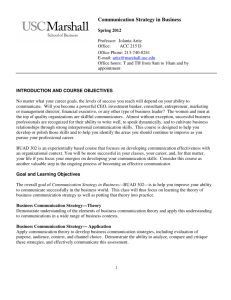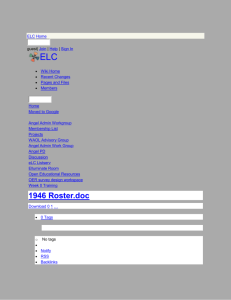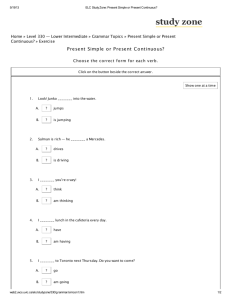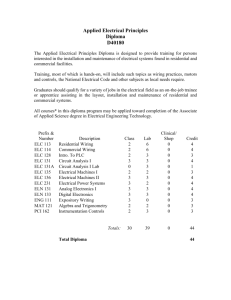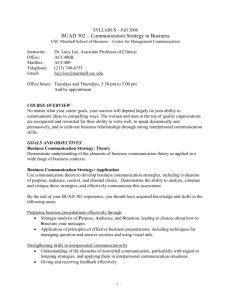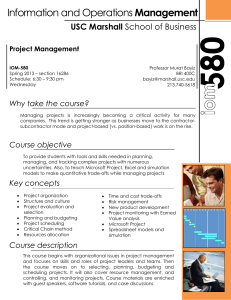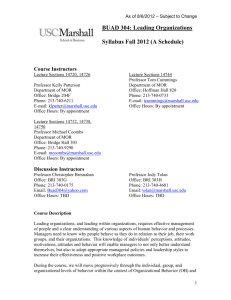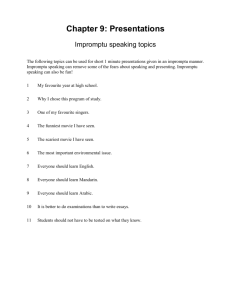Giaquinta BUAD 302 Fall14 Syllabus
advertisement
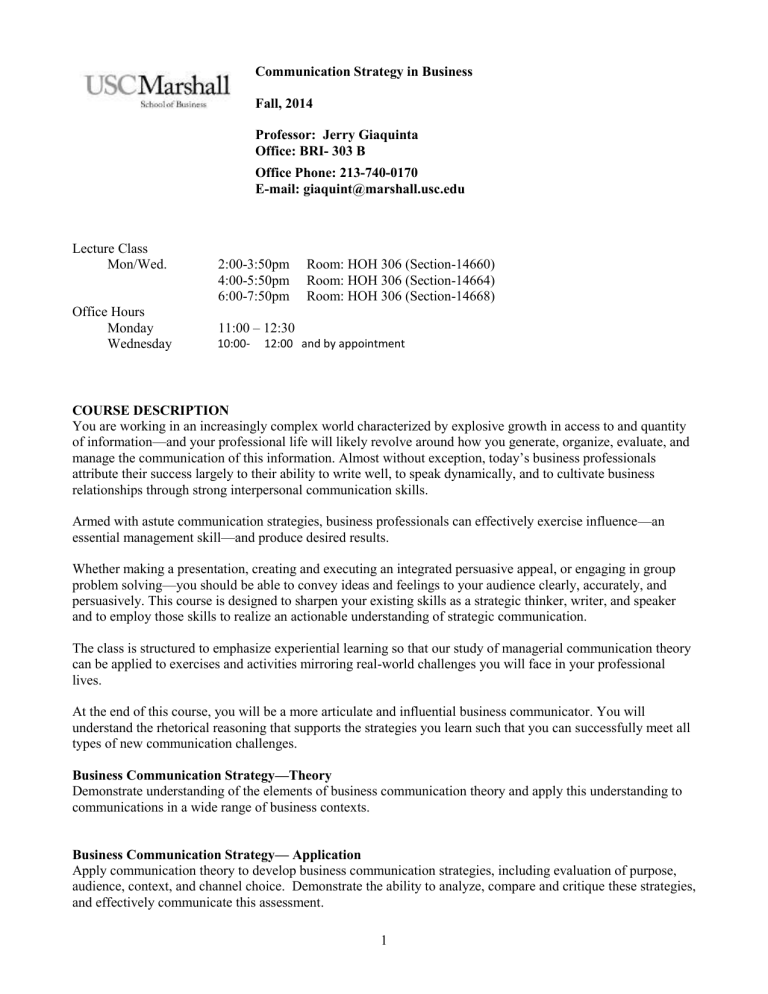
Communication Strategy in Business Fall, 2014 Professor: Jerry Giaquinta Office: BRI- 303 B Office Phone: 213-740-0170 E-mail: giaquint@marshall.usc.edu Lecture Class Mon/Wed. Office Hours Monday Wednesday 2:00-3:50pm 4:00-5:50pm 6:00-7:50pm Room: HOH 306 (Section-14660) Room: HOH 306 (Section-14664) Room: HOH 306 (Section-14668) 11:00 – 12:30 10:00- 12:00 and by appointment COURSE DESCRIPTION You are working in an increasingly complex world characterized by explosive growth in access to and quantity of information—and your professional life will likely revolve around how you generate, organize, evaluate, and manage the communication of this information. Almost without exception, today’s business professionals attribute their success largely to their ability to write well, to speak dynamically, and to cultivate business relationships through strong interpersonal communication skills. Armed with astute communication strategies, business professionals can effectively exercise influence—an essential management skill—and produce desired results. Whether making a presentation, creating and executing an integrated persuasive appeal, or engaging in group problem solving—you should be able to convey ideas and feelings to your audience clearly, accurately, and persuasively. This course is designed to sharpen your existing skills as a strategic thinker, writer, and speaker and to employ those skills to realize an actionable understanding of strategic communication. The class is structured to emphasize experiential learning so that our study of managerial communication theory can be applied to exercises and activities mirroring real-world challenges you will face in your professional lives. At the end of this course, you will be a more articulate and influential business communicator. You will understand the rhetorical reasoning that supports the strategies you learn such that you can successfully meet all types of new communication challenges. Business Communication Strategy—Theory Demonstrate understanding of the elements of business communication theory and apply this understanding to communications in a wide range of business contexts. Business Communication Strategy— Application Apply communication theory to develop business communication strategies, including evaluation of purpose, audience, context, and channel choice. Demonstrate the ability to analyze, compare and critique these strategies, and effectively communicate this assessment. 1 DETAILED LEARNING OBJECTIVES This course is designed for you to acquire knowledge and skills in business communication. The BUAD 302 experience will enable you to: 1. Identify and discuss communication theories, models, and principles that impact business communication across diverse industries and fields in a global landscape by analyzing specific communication behaviors, strategies, and goals through case studies and group discussions. 2. Apply communication theories and principles to achieve communication goals by evaluating the purpose of your message, conducting audience analysis, and selecting the appropriate communication channel to successfully construct and deliver presentations individually and as part of a team in various business contexts. 3. Utilize critical thinking skills to develop and implement communication strategies across diverse business environments by analyzing, comparing, and evaluating the effectiveness of these strategies via scenario-based simulations and exercises. 4. Develop an understanding and awareness of ethical principles and intercultural and diversity factors that impact the communication process as business leaders, managers, colleagues and employees by analyzing and explaining ethical challenges and incidents in their cultural and organizational contexts. 5. Acquire and apply an understanding of small group communication dynamics, including learning to evaluate and articulate obstacles that impact effective team communication and developing collaborative deliverables. After only fifteen weeks, you probably will not reach a level of professional excellence in all business communication areas; mastery sometimes takes years and always takes dedication. You will, however, clearly understand the strategic objectives toward which you are working, understand the necessary processes involved in meeting those objectives (and helping others meet them), appreciate your strengths and challenges, and feel increased confidence in your communication decisions and in the execution of those decisions. Text: Cardon, Peter W. Business Communication: Developing Leaders for a Networked World (Mc Graw-Hill 2014). PAPERBACK Course Requirements: Prepare and deliver 3 individual presentations Prepare and deliver your portion of 1 team presentation Complete 1 final exam Participate in 1 mock interview in the Experiential Learning Center (ELC) on the third floor of JKP (dates-see below) (Although this is ungraded, you must participate in order to fulfill the responsibilities of the course.) Participate in a number of brief, impromptu, individual class presentations 2 The BUAD 302/Writing 340 Connection: As a Business major, you most likely will take both 302 and Writing 340 Advanced Writing for Business, and you will find logic in Marshall’s partnering of these two courses. A close nexus exists between carefully crafted written communication and well-presented oral communication. Together, these two courses lend you a skill set that will well prepare you for business leadership. Naturally, perfectly polished oral and written communication cannot be accomplished in the course of a fifteen-week term. It requires lifelong practice, and all of us can continually become better at it. Our true objective in BUAD 302 is to lay a foundation for mastery of the skills you will perfect throughout your career. Properly learned, the techniques that you undertake now will serve you long after you leave this class. Class Responsibilities: I will hold you to the same standards of professionalism that you can expect in the workplace. In our case, that means being prepared and attending class on time. Of course, any one of us may be sick or beset with a personal or family emergency or transportation difficulties on occasion. Still, we are obliged to return to our academic or professional responsibilities as soon as we can. If you should miss a class, you are still obliged to complete assignments in a timely fashion. Six of our class meetings will take place in the Experiential Learning Center (ELC). Because the ELC is in constant demand, it will be highly unlikely you will be able to reschedule a presentation date. Please pay attention to your demeanor in class. Although I will never insist that you agree with my opinions or those of your classmates, when you do disagree please do so with tact and courtesy. I encourage genteel arguments on course matters because I believe it helps develop the habit of independent thinking, however, people of good will and intelligence often disagree about controversial themes. This acceptance will allow you to positively contribute to lively and engaging class meetings, something for which your classmates and I will be grateful. Please turn off your computer, wireless phone, iPod, iPad, BlackBerry, and any other electronic device that beeps or plays music, and do not use class time to catch up on the DT, WSJ, or any other reading that we are not discussing that particular day. 3 Grading Weights: 3 Individual Informative/Persuasive Presentations (20% each) 60% You will have three different topics upon which to present, each for five-seven minutes, and some of which will include research- no visuals. 1 Team Presentation 15% In a team of five or six students, you will prepare and deliver a group presentation that will last 20 minutes. These presentations will incorporate graphics and multi-media. The Team Project presentations will be given in class in class(not taped). 1 Final Exam 15% Impromptu Class Presentations 10% A number of very short individual, impromptu presentations will occur in our classroom. The remainder of this score will consist of the extent to which you observe the General Responsibilities outlined immediately above. Total 100% Evaluation: Grades in this class are an assessment of the overall quality of your work. This takes into account the critical thinking that went into the presentation’s creation, as well as the finished product including content, presentation mechanics, and their delivery. For the final exam, I will solicit your understanding of concepts, techniques, and applications of successfully presenting business information. I promise to do my best to give you lucid assignments with explicitly stated expectations and then to evaluate your work as fairly and objectively as possible. Further, I will earnestly try to return grades to you within 10 days of the due date. If, however, you believe that I have made an error in grading your work, you may request that I re-evaluate it within one week of the grade’s return. In order to do so, write a brief memo to me in which you lay out the reasons why you think that you deserve a different grade and what that grade should be. I will consider such requests carefully and deliberately and then relay my decision to you. 4 Special Activities: Meetings in the Experiential Learning Center (ELC): Throughout the semester, we will meet in the ELC on the “Garden Level” of Bridge Hall. (See the dates noted below in the class schedule.) You will be videotaped during the majority of the presentations and exercises completed at these times. As we will often require all of our designated time in the ELC on those occasions, please ensure that you arrive on time so that none of it is squandered. Career Planning Center (CPC) Information Session: We will meet in our normal classroom for a workshop conducted by a CPC staff member. This workshop will focus on interview process strategies for securing internships and jobs, networking, and utilizing all of the resources available to you at the CPC. Mock Interviews: Mock job interviews have been scheduled for the following weekends dates: (Oct 11, 12, 25, & 26). You will be assigned one 20-minute session during one of the four-day time periods selected. During your session, MBA students and Marshall faculty will interview as if you actually were seeking a job position. Please dress in business professional attire. This non-graded interview is a required exercise in which all 302 students must participate. Tips for Successfully Completing BUAD 302: If you are prone to communication apprehension, know that you are in good company. The more one practices the art of public speaking, the better and more comfortable he/she becomes. Similarly, the first time that you are videotaped when presenting can induce some discomfort as you watch the replay. This, too, is natural, and most of us soon acclimate to the prospect of watching ourselves on screen (even if we never truly look forward to it). My task is to provide sufficient presentation time for all of you so that formal speaking becomes first manageable and then perfectible. Each of us develops oral proficiency at a different rate. Therefore, do not judge your progress in our class relative to that of your peers. While I cannot guarantee that everyone in class will develop the same level of polished presentation capability, I have never had a student who didn’t become a better speaker if he or she worked at that task and in consultation with me. Though it sounds like a pro-forma statement that you might expect from your instructor, I guarantee that the skills you develop in this course are far more important than the grade that you receive. I believe that using brief notes discreetly during a presentation is normal and unavoidable. (Even the most accomplished presenters use note cards.) Still, our goal in class is to reduce your usage of notes to a minimum – they should serve you without your becoming a slave to them. Be an attentive, active listener to others’ presentations. You genuinely learn as much from observing and critiquing the presentations of others as you do from making them. As each of us becomes an audience for one another, we will create a beneficial oral learning community. I intend that you develop an ability to connect with your audience and sustain your credibility through the explication of your ideas. This requires ample preparation and rehearsal on your part as well as confident and authoritative delivery. Although this may be easier to declare than to accomplish, it remains the goal we set for ourselves. 5 MARSHALL GUIDELINES Add/Drop Process: In compliance with USC and Marshall’s policies classes are open enrollment (R-clearance) through the first week of class. All classes are closed (switched to D-clearance) at the end of the first week. This policy minimizes the complexity of the registration process for students by standardizing across classes. I can drop you from my class if you don’t attend the first two sessions. Please note: If you decide to drop, or if you choose not to attend the first two session and are dropped, you risk being not being able to add to another section this semester, since they might reach capacity. You can only add a class after the first week of classes if you receive approval from the instructor. Further, if you are absent six or more times prior to February 5, 2013, I will ask you to withdraw by that date. These policies maintain professionalism and ensure a system that is fair to all students. Marshall Grading Guidelines: Course Grading Policy: Marshall’s target mean GPA is 3.0 for required classes and 3.3 for electives. The mean target for graduate classes is 3.3. Assignment/Exam Grading Policy: the instructor determines what qualifies as an accurate grade on an assignment, exam, or other deliverable, and the instructor’s evaluation of the performance of each individual student is the final basis for assigning grades for the course. Final exams and all other graded work which affected the course grade will be retained for one year after the end of the course if the graded work has not been returned to you, i.e., if I returned a graded paper to you, it is your responsibility to file it, not mine. Statement for Students with Disabilities: Any student requesting academic accommodations based on a disability is required to register with Disability Services and Programs (DSP) each semester. A letter of verification for approved accommodations can be obtained from DSP. Please be sure the letter is delivered to me (or to TA) as early in the semester as possible. DSP is located in STU 301 and is open 8:30 a.m.–5:00 p.m., Monday through Friday. The phone number for DSP is (213) 740-0776. Statement on Academic Integrity: USC seeks to maintain an optimal learning environment. General principles of academic honesty include the concept of respect for the intellectual property of others, the expectation that individual work will be submitted unless otherwise allowed by an instructor, and the obligations both to protect one’s own academic work from misuse by others as well as to avoid using another’s work as one’s own. All students are expected to understand and abide by these principles. SCampus, the Student Guidebook, contains the Student Conduct Code in Section 11.00, while the recommended sanctions are located in Appendix A. http://www.usc.edu/dept/publications/SCAMPUS/gov/ Students will be referred to the Office of Student Judicial Affairs and Community Standards for further review, should there be any suspicion of academic dishonesty. The Review process can be found at: http://www.usc.edu/student-affairs/SJACS/ Failure to adhere to the academic conduct standards set forth by these guidelines and our programs will not be tolerated by the USC Marshall community and can lead to dismissal. Emergency Preparedness/Course Continuity: 6 In case of emergency, and travel to campus is difficult, USC executive leadership will announce an electronic way for instructors to teach students in their residence halls or homes using a combination of Blackboard, teleconferencing, and other technologies. Instructors should be prepared to assign students a "Plan B" project that can be completed at a distance. For additional information about maintaining your classes in an emergency please access: http://cst.usc.edu/services/emergencyprep.html Please activate your course in Blackboard with access to the course syllabus. Whether or not you use Blackboard regularly, these preparations will be crucial in an emergency. USC's Blackboard learning management system and support information is available at blackboard.usc.edu. Incomplete Grades: In incomplete (IN) grade may be assigned due to an “emergency” that occurs after the 12th week of classes. An “emergency” is defined as a serious documented illness, or an unforeseen situation that is beyond the student’s control, that prevents a student from completing the semester. Prior to the 12 th week, the student still has the option of dropping the class. Arrangements for completing an IN course should be initiated by the student, and negotiated with the instructor. Class work to complete the course should be completed within one calendar year from the date the IN was assigned. The IN mark will be converted to an F grade should the course not be completed. Assignment Submission Policy: Any assignment turned in late, even if by only a few minutes, will receive a grade deduction (for example, if your work is a B+ grade, you will be given a C+ grade). If your Internet breaks down on the due date, you must deliver a hard copy at the beginning of class on that day. If you are unable to attend class on that day, make arrangements for it to be delivered to the classroom or to my box by the start of class. Late or not, however, you must complete all required assignments to pass this course. Evaluation of Your Work: You may regard each of your assignments as an “exam” in which you apply what you’ve learned according to the assignment. I will do my best to make my expectations for the various assignments clear and to evaluate them as fairly and objectively as I can. If, however, you feel that an error has occurred in the grading of any assignment, you may, within one week of the date the assignment is returned to you, write me a memo in which you request that I re-evaluate the assignment. For presentations, explain fully and carefully based providing me with examples per the timer countdown of the video why you think the presentation should be re-graded. Be aware that the re-evaluation process can result in three types of grade adjustments: positive, none, or negative. All grades assigned by faculty members are final. Students have the right to seek explanation, guidance, counsel and reasons for the assignment of a grade. Students may appeal a grade according to university policy as set forth in SCampus. Faculty may initiate a change in grade if there is an error in the calculation of a grade. However, a faculty member may not change a disputed grade outside the formal appeals process. In response to a disputed academic evaluation by an instructor, a student is entitled to two levels of appeal after review by the instructor: first to the chairperson of the department and then to the appropriate dean of the school. The full university policy can be found on page 125 of SCampus and at: http://www.usc.edu/dept/publications/SCAMPUS/gov/disputed_academic_evaluation_procedures.html 7 A Personal Note: I welcome you to BUAD 302 Communication Strategy in Business and look forward to the semester before us. You will find me to be very accessible during my regular office hours on Tuesday and Thursday. If my posted times will not work for you, I encourage you to call or e-mail me to make alternate arrangements to meet. Fulfilling the responsibilities of this class is something that we will take on together. If you need to deliver a hard copy of something to me, you may do so either at my office, BRI 303-B, or through my faculty mailbox in ACC 400. The Lost and Found area for the Marshall School is located in BRI 204. If you leave anything behind after class, it will be taken there. Conversely, if you lose an item, you should report your loss to the Lost and Found and will be contacted upon its discovery. COURSE SCHEDULE (Note: Schedule Is Subject To Change) 8 Date Topic Readings/Due Dates Course Learning Objectives (per session) 8/25 Course Introduction and Syllabus Review; Individual Introductions; Basics of Communication Strategy: Why It Matters to You! CH. 1 1, 2 8/27 Non-Verbal Communication; Overcoming Presentation Anxiety “Killer Presentation Skills” DVD Job Ad search Distribute Presentation# 1 Impromptu Exercise#1 In class resume CH 15 1,2,3,4,5 CH 2 1, 2, 3 9/8 Communication and Career Development: Career Placement Center Staff Presentation Research and Assigned Articles 1, 2, 4, 5 9/10 Communication and Career Development; “Common Mistakes People Make in Interviews” and “Looking Great at Work” Assigned Articles and DVD 1,2 9/15 Behavioral Theories that Impact Communication; Impromptu Exercise #2 PRESENTATION#1 BRI-ELC CH 14 1, 2, 3, 5 9/22 Persuasion Techniques: Body Language Ch 9,10 and DVD 1,2 9/24 Handouts 2,4 9/29 “How to Prepare for the Unexpected Short Speech” Impromptu Exercise#3 Prepping for HiFli 10/1 ELC EXERCISE: Hi-Fli Articles Assigned 2, 5 10/6 Understanding and Applying the Critical Thinking Skills Formula: F.I.A.C/R. (Comparing Legal and Business Analytical Approaches) The Facebook Dilemma: Applying the F.I.A.C/R Critical Thinking Skills Formula-Impromptu Exercise#4 Handout 2,3 10/8 ELC Exercise: ”Ethics” BRI-ELC 9/3 9/17 2,5 9 1,4,5 10/13 Presentation#2 Assigned; Part 1 In class movie: “TBD” Class Disc. DVD, Assigned Articles 2,3 10/15 Part 2: In class Movie: TBD”. Class discussion Part 2 DVD 2,3 10/20 Persuasion Techniques: Cultural and Global Communication Styles CH 4, DVD, Assigned Articles 1,2,4 10/22 Presentation #2 BRI-ELC Speech to Persuade(Based on in class film)-Critical Thinking Skills 10/27 Managing New Communication Channels in the Workplace; Leveraging Your Knowledge of the Audience to Achieve Your Communication Goal 1,2,4,5 Ch. 3 Handouts 1,4,5 10/29 Impromptu Exercise #5 Audience Engagement and Emotion 1,2,4,5 11/3 Presentation # 3 Assigned: “A Speech to Inform” ELC Exercise: Good Neighbors 1,2,4 11/5 11/10 11/12 11/17 Team Project Assigned and Teams Selected: Understanding team communication challenges and opportunities 3,5 CH 3 1,5 DVD 1,2,4,5 Death by PowerPoint” DVD: Team Workshops Impromptu#3 –Speech to Inform” 11/19 PRESENTATION#3 BRI-ELC A Speech to Inform 11/24 Virtual Team Meeting 12/1 TEAM PRESENTATIONS IN CLASS 12/3 TEAM PRESENTATIONS IN CLASS LAST DAY OF CLASS! 5 1,2,4 Research Assignment 10 5 APPENDIX Alignment of Course Learning Objectives with Marshall’s Six Undergraduate Program Learning Goals Goal # 3 5 6 Marshall Program Learning Goal Description Covered in this Course (Goals 3, 5, 6 and relevant selected sub-goals) Our graduates will demonstrate critical thinking skills so as to become future-oriented decision makers, problem solvers and innovators. Specifically, students will: 3.1 Students will understand the concepts of critical thinking, 3.2 Critically analyze concepts, theories and processes by stating them in their own words, understanding key components, identifying assumptions, indicating how they are similar to and different from others and translating them to the real world. 3.3 Be effective at gathering, storing, and using qualitative and quantitative data and at using analytical tools and frameworks to understand and solve business problems. 3.4 Demonstrate the ability to anticipate, identify and solve business problems. They will be able to identify and assess central problems, identify and evaluate potential solutions, and translate a chosen solution to an implementation plan that considers future contingencies. Our graduates will demonstrate ethical reasoning skills, understand social, civic, and professional responsibilities and aspire to add value to society. Specifically, students will: 5.1 Understand professional codes of conduct. 5.2 Recognize ethical challenges in business situations and assess appropriate courses of action. Our graduates will be effective communicators to facilitate information flow in organizational, social, and intercultural contexts. Specifically, students will: 6.1 Identify and assess diverse personal and organizational communication goals and audience information needs. 6.2 Understand individual and group communications patterns and dynamics in organizations and other professional contexts. 6.3 Demonstrate an ability to gather and disseminate information and communicate it clearly, logically, and persuasively in professional contexts. 11 Course Objectives Relevant Course Assignments Moderate (Course learning objectives 2, 3, 4) ELC: Ethics Exercise ELC: Hi-Fli Exercise ELC: Good Neighbors Exercise Facebook Exercise (In-Class) Presentation #2: The Inside Job Presentation #3: Speech to Inform Team Assignment Final Exam Assigned Readings (text) and Discussion Moderate (Course learning objectives 2, 3, 4, 5 ) ELC: Ethics Exercise ELC: Good Neighbors Exercise Presentation#2 Inside Job Team Assignment Assigned Readings (text) and Discussion High (Course learning objectives 1-5) Presentation #1: Professional Assessment Presentation #2: Inside Job Team Project Ted Talk content analysis ELC: Ethics Exercise ELC: Hi-Fli Exercise ELC: Good Neighbors Exercise Assigned Readings (text) and Discussion
